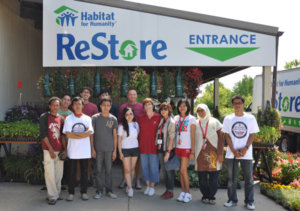How to Get into an Industry That Makes a Difference
Published on April 26, 2018, at 7:23 p.m.
by Colin Wylie.
Want to go to sleep each night with a sense of satisfaction? Try CSR.

Corporate social responsibility, corporate citizenship, sustainability, corporate accountability — whatever you want to call it, corporate responsibility is a trending topic in the communications industry. New studies are constantly being published, indicating a necessity for organizations to focus on their social roles. Investors, employees and customers are demanding that companies build structural foundations on social best practices.
Larry Fink, CEO of BlackRock, a multinational investment management corporation, said in a recent letter to CEOs, “A company’s ability to manage environmental, social, and governance matters demonstrates the leadership and good governance that is so essential to sustainable growth.”
CSR is not only helpful for the growth of the company, but can also spur major growth in the personal development of professionals working in the field. Imagine going to work each day with purpose, knowing that your efforts could change the world.
But here’s the catch. This niche industry is small, and entry-level opportunities are limited.
To get a better idea of how young professionals can position themselves for a career in CSR, I spoke with Gail Chandler and Sean Rico Fisher, professionals with experience in the industry. Chandler is a retired head of Citizenship Communications and Community Relations for Texas Instruments, while Fisher was recently promoted as the corporate responsibility manager, program effectiveness, for the Silicon Valley Community Foundation. Both gave unique perspectives of how students could breakout into the growing industry.

Expand your knowledge and understand what companies are doing
Most professionals and educators will advise students to stay current on industry news and upcoming trends. There are numerous organizations that regularly publish research about CSR. Chandler mentioned studying articles from organizations like Boston College Center for Corporate Citizenship, CR Magazine and Ethisphere, among others, will help you to stay ahead of the curve.
Fisher suggested students should read CSR reports from different companies, as well as CSR job descriptions. He explained, “By looking at an organization’s CSR report, you will become familiar with how companies talk about CSR and what it means to them.”
With regard to job descriptions, Fisher gave this unique insight: “In order for a job description to be posted, it means that a lot of internal conversations had to have happened in order for that job to be created. Those bullet points are telling you what the company is trying to do. Job functions are there to solve a problem.”
Get involved with local networks of CSR practitioners
Another critical step is to build relationships with like-minded people, including finding professionals who work in the industry.
“Throughout the country there are informal networks of CSR practitioners,” said Fisher. “They get together and talk about CSR — challenges they face and how each organization wants to help the community as a whole.” Students might also search for CSR professionals and conduct informational interviews and attempt to build relationships with people working in the industry.

Develop technical skills and become an expert in your field
Fisher also advised that students should focus on developing technical skills and master what you are studying. For public relations students, that includes writing, strategy, social media and account management.
In an article by Amanda Minuk on bmeaningful.com, she stated, “Companies want to know what you can do for them, and how your unique skill set will be beneficial for the company. In CSR it’s about knowing how to communicate well and turn insights and research into compelling cases in presentations, writings and conversations.”

Look for unique ways to serve in your community
Chandler attributes the beginnings of her journey into CSR to her time working for city government and local school districts. She says this experience “gave me the grounding that I needed in community issues to take to a corporate environment.” Depending on if you want to work in philanthropy, environmental initiatives or sustainability, or work strictly with nonprofit organizations, it’s important to be involved with groups that will help you develop experience and relationships in those areas.
An uncertain road map
Many companies are still trying to determine how these practices fit in their corporate structure and do not offer traditional internships to help students and graduates gain necessary experience, which means the exact process of getting a job in CSR is different for everyone. There is no step-by-step solution, but both Chandler and Fisher felt confident in the future of the industry. As students increase their knowledge through education, build social networks and develop skills, they can position themselves to start a career in CSR.




